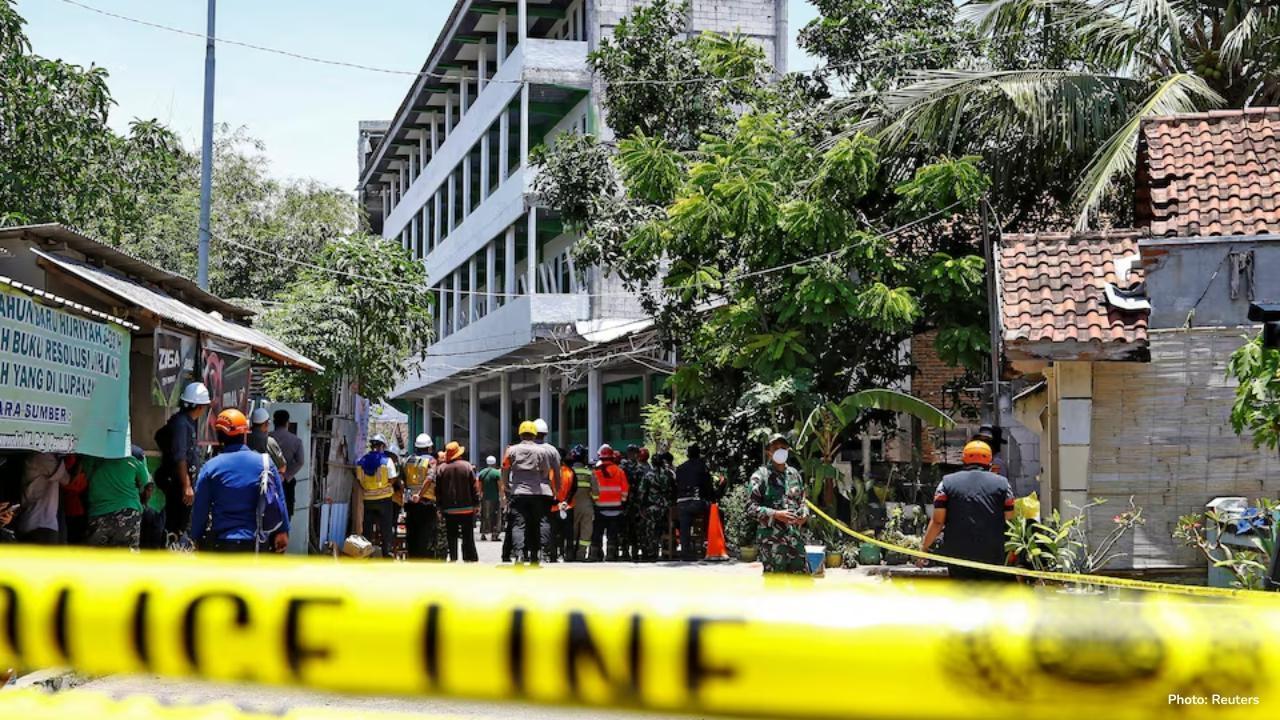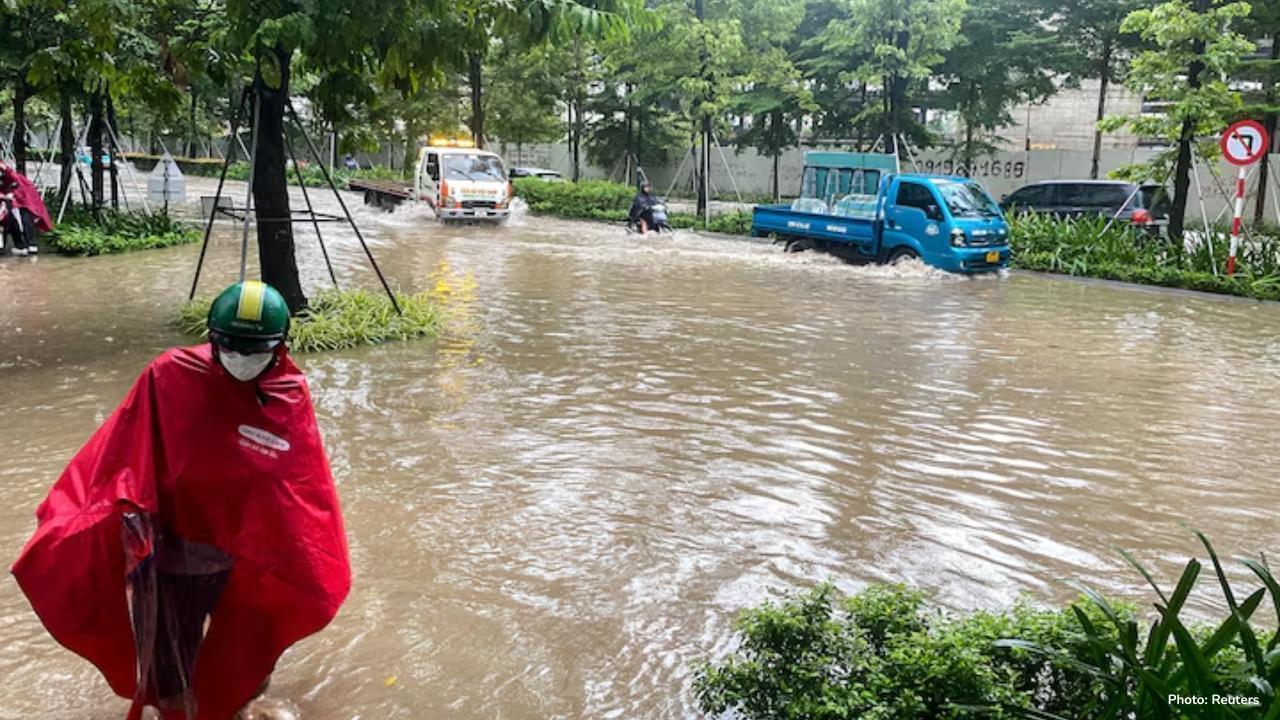
Post by : Monika
A Finnish court has recently ruled that it cannot prosecute the captain and officers of the Eagle S oil tanker for damaging undersea cables in the Baltic Sea. This decision has drawn significant attention internationally because it involves questions about maritime law, the protection of critical infrastructure, and international accountability.
The Incident
The incident occurred in December 2024 when the Eagle S, an oil tanker registered in the Cook Islands, was moving through the Baltic Sea. Investigators claim that the ship's anchor dragged along the seabed for approximately 90 kilometers, severing five undersea cables.
These cables were critical: they included the Estlink 2 electricity cable connecting Finland and Estonia and four major internet cables that transmit data across the region. As a result of this damage, there were disruptions to power and internet services in multiple countries bordering the Baltic Sea.
The damage raised alarm not only for the affected countries but also for businesses, internet providers, and authorities responsible for energy transmission. Undersea cables are essential for modern life, and their repair can take months and cost millions of euros.
Legal Proceedings
Finnish prosecutors had charged the captain, a Georgian national, and two officers—one Georgian and one Indian—with aggravated criminal mischief and interference with telecommunications. If found guilty, the captain could have faced up to 10 years in prison, while the officers faced up to 5 years.
The defendants, however, denied all allegations. They claimed the incident was accidental, caused by technical or operational problems on the ship. They insisted there was no intent to damage any infrastructure.
The case became highly publicized because of broader suspicions surrounding the Eagle S. Authorities suspected that the tanker might have been part of a “shadow fleet” used by Russia to evade oil export sanctions. Since the war in Ukraine began in 2022, many Baltic Sea nations have been on high alert regarding Russian shipping movements and potential threats to infrastructure.
Court Decision
On October 3, 2025, the Finnish district court officially ruled that it did not have jurisdiction over the case. The main reason was that the Eagle S is registered in the Cook Islands. According to international maritime law, a vessel’s flag state generally has authority over incidents involving the ship while in international waters.
Additionally, the court concluded there was no clear evidence of intentional wrongdoing by the crew. This meant that even if the damage had occurred, it could not be considered a deliberate act under Finnish law.
The crew had already left Finland, and the ship had been released earlier in March 2025. This ruling effectively ends the possibility of Finnish prosecution for this incident.
Implications of the Ruling
The court’s decision highlights several important issues. First, it underscores the complexity of maritime law and the challenges of enforcing national laws in international waters. While Finland has territorial jurisdiction in its waters, the damaged cables were mostly outside its direct territorial waters. This limits the legal reach of Finnish courts.
Second, the case raises questions about accountability for damage to undersea infrastructure. Undersea cables carry electricity and communication signals essential for modern life, including internet access, banking, government operations, and energy distribution. Damage to these cables can disrupt economies, businesses, and citizens’ daily lives.
Because the court found no intentional wrongdoing, affected parties may struggle to receive compensation or justice. This raises concerns about how nations and companies can protect critical infrastructure in international waters and hold responsible parties accountable.
Importance of Undersea Cables
Undersea cables are crucial to the modern digital world. They carry nearly all international data traffic and energy transmission, connecting countries and continents. Even small disruptions can cause major interruptions in communication, banking systems, and power grids.
In recent years, there have been growing concerns about the security of undersea cables, especially amid geopolitical tensions. Deliberate or accidental damage can have consequences for national security, economic stability, and international relations.
The Eagle S case shows how vulnerabilities exist in international waters. Without clear jurisdiction, countries may struggle to enforce laws, prevent damage, and ensure timely repairs.
International Reactions
The ruling has drawn attention beyond Finland. Legal experts note that international law governing the seas is complex and often leaves gaps in enforcement. The United Nations Convention on the Law of the Sea (UNCLOS) provides some rules, but practical enforcement often depends on the flag state of the vessel and cooperation between countries.
In this case, the Cook Islands, as the flag state, holds primary responsibility for addressing any wrongdoing by the ship or crew. However, communication and legal processes between nations can be slow and complicated.
Additionally, the incident highlights security concerns in the Baltic Sea, especially since the area has seen multiple infrastructure threats following the war in Ukraine. Countries in the region may now review measures to monitor shipping, protect undersea cables, and enhance maritime security.
Economic and Strategic Implications
The cable damage caused by the Eagle S had immediate economic effects. Disrupted internet connections affected businesses relying on digital communication, including banks, trading platforms, and tech companies. Power interruptions also required temporary rerouting of electricity, highlighting the vulnerability of energy networks.
The cost of repairing the cables was significant, requiring specialized ships, divers, and equipment. This also caused delays in shipping and trade across the Baltic Sea.
Strategically, the incident shows the importance of maritime vigilance and international cooperation. Countries dependent on undersea infrastructure need to work together to prevent accidental or deliberate damage. They may also need to establish clearer legal frameworks for assigning responsibility when incidents occur in international waters.
Future Considerations
The Eagle S case may prompt discussions among countries about how to protect undersea infrastructure and enforce accountability. Experts suggest several measures:
The case also highlights the limitations of current maritime law. While UNCLOS provides a legal framework, enforcement relies heavily on flag states and international cooperation. Gaps in jurisdiction can leave affected countries with limited options for recourse.
The Finnish court’s ruling that it cannot prosecute the Eagle S crew over the Baltic Sea cable damage underscores the complexity of international maritime law. While the incident caused significant disruption to power and communication, the court found that it lacked authority over the Cook Islands-registered vessel and that there was no evidence of intentional wrongdoing.
The incident has already prompted discussions among nations bordering the Baltic Sea about enhancing monitoring, security, and legal frameworks to prevent future damage. It serves as a reminder that undersea cables are not just technical installations—they are lifelines for economies, communication, and energy networks.
As global reliance on undersea cables grows, ensuring their safety, security, and repair mechanisms will be increasingly important. While the Finnish court’s decision ends this particular case, it may act as a catalyst for broader international discussions on maritime infrastructure protection and accountability in international waters.
Finland court Baltic Sea cable Eagle S oil tanker damage International maritime law










AI Startup Valuations Spark Concerns of Market Bubble Amid Funding Surge
AI startups are attracting record investments, but experts warn that inflated valuations may signal

Ambulances Line Up as Indonesia Searches for Students After School Collapse
A school in East Java collapsed during afternoon prayers. Dozens of students are trapped, and rescue

Typhoon Bualoi Kills 51 in Vietnam; Banks Asked to Aid Affected Firms
Typhoon Bualoi caused heavy damage and killed 51 people in Vietnam. The central bank has urged banks

South Korea's President Urges North Korea to Resume Family Reunions
South Korean President Lee Jae Myung calls on North Korea to restart family reunions for those separ

Finnish Court Rules It Can't Prosecute Crew Over Baltic Sea Cable Damage
A Finnish court has decided it doesn't have the authority to prosecute the crew of the Eagle S oil t

Czech Republic Votes: Billionaire Babiš Promises Higher Wages, Less Support for Ukraine
In the Czech Republic's upcoming elections, billionaire Andrej Babiš's party leads with promises of